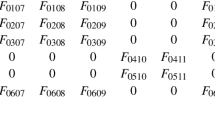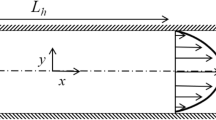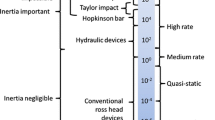Summary
This paper describes three complementary methods of measuring the rheological response of polymer melts under tension. A specially designed rheometer maintains constant stress throughout the deformation and gives well defined data, but is limited to high viscosity materials. The two other systems which have been studied are the deformation during the drawdown of an extrudate and that of convergent flow. A wide range of materials and degrees of deformation can be studied though the results are less precise. With empirical assumptions these systems yield data which are consistent with those obtained from the rheometer over a wide range of conditions.
Viscous, elastic and plastic deformations are observed. The viscosity is, in general, independent of stress: its value is three times the limiting shear viscosity at low stress. Important departures from this rule occur for polythene and polypropylene. The viscosity of low density polythene increases with stress over a limited range of stress. This behaviour is associated with branching. Theviscosityof polypropylene decreases with stress. The elastic modulus at low stress is commonly in the range 105–106 dyn/cm2 and is largely independent of temperature and molecular weight. At high stress there is a limiting elastic strain of about 2.0 units. Low density polythene has a plastic breaking stress of about 107 dyn/cm2. The breaking stress increases with temperature.
Zusammenfassung
Die Arbeit beschreibt drei sich ergänzende Methoden zur Messung des Theologischen Verhaltens polymerer Schmelzen unter Zugbeanspruchung. Ein speziell ausgelegtes Rheometer sorgt für eine konstante Spannung während der Deformation und ergibt eindeutige Meßgrößen. Es ist allerdings auf hochviskose Stoffe beschränkt. Die beiden anderen Methoden, die untersucht wurden, sind zum einen die Deformation während des Abziehens eines Extrudates und zum anderen die der konvergenten Strömung. Auf diese Weise können zahlreiche Stoffe und Verformungsgrade untersucht werden, obwohl die Ergebnisse weniger genau sind. Unter empirischen Annahmen ergeben diese Systeme Größen, die mit den mit Hilfe des Rheometers für einen weiten Bereich von Bedingungen ermittelten Ergebnissen übereinstimmen.
Viskose, elastische und plastische Deformationen werden beobachtet. Die Viskosität ist im allgemeinen unabhängig von der Spannung; ihr Wert ist dreimal größer als die Grenz-Scherviskosität (bei geringer Spannung). Wichtige Abweichungen von dieser Regel treten bei Polyäthylen und Polypropylen auf. Die Viskosität von Polyäthylen niedriger Dichte wächst mit der Spannung in einem begrenzten Spannungsbereich. Dieses Verhalten ist von Verzweigungen begleitet. Die Viskosität des Polypropylens fällt dagegen mit der Spannung ab. Der Elastizitätsmodul liegt im allgemeinen zwischen 105 und 106 dyn/cm2 und ist weitgehend von der Temperatur und dem Molekulargewicht unabhängig. Bei hoher Spannung zeigt sich eine begrenzende elastische Dehnung von etwa 2 Einheiten. Polyäthylen geringer Dichte hat eine plastische Bruchspannung von etwa 107 dyn/cm2. Die Bruchspannung wächst mit der Temperatur.
Similar content being viewed by others
References
Ballman, R. L., Rheol. Acta4, 137 (1965).
Cogswell, F. N., Trans. J. Plastics Inst. (In Press), PL/274/A.
Trouton, F. T., Proc. Roy. Soc.A 77, 426 (1906).
Lamb, P., S. C. I. Monograph26, 296 (1967).
Cogswell, F. N. andP. Lamb, Trans. J. Plastics Inst.35, 809 1967).
Author information
Authors and Affiliations
Rights and permissions
About this article
Cite this article
Cogswell, F.N. Tensile deformations in molten polymers. Rheol Acta 8, 187–194 (1969). https://doi.org/10.1007/BF01984657
Received:
Issue Date:
DOI: https://doi.org/10.1007/BF01984657




